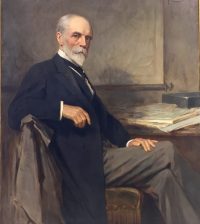As the members straggled in this morning Judge Day explained that a long cipher dispatch had come, and was being translated. While awaiting it we discussed the probability that the Spaniards would refuse to agree to anything we could propose, and the general judgment tended this way. When the translated dispatch was brought up it proved to follow tolerably closely in its reasoning the lines of my dispatch sent last week, and in one place it referred to Senator Frye’s and my suggestions by name. It provided for the retention of the whole Philippines and an effort to procure the most eastern of the Carolines. It disclosed an apprehension that either Judge Day or Secretary Moore might have made some commitment to the German Ambassador in Washington, which would interfere with this.
The dispatch was listened to in profound silence, but after a few moments Senator Gray broke out in the most earnest and vehement expression he has yet made. [He deplored] the whole attitude and [declared] that the government was in a hypocritical position, really striving for the utmost conquest possible, while professing to be controlled solely by motives of duty and humanity. He ended with the exclamation: “If you do get such a treaty you won’t get it ratified.” No one made the slightest reply. In a few moments he was as placid as the rest of us and joined in the discussion as to the wisdom of drawing up a proposal in which we should now embody our ultimatum.
Gen. Porter was announced in the midst of this, and came in with a story of an interview which some unnamed friend of his had had with Castillo. It was substantially to the same effect with what we had already heard; that they [the Spanish] declared they could not and would not make martyrs of themselves at home by signing such a treaty. If the United States resumed hostilities they could not be much worse off, and would at least preserve their honor, yielding only to superior force. [They thought] it was possible that the United States might not resume active hostilities, although they assumed, of course, that she would take whatever she wanted of the Philippines. Castillo had admitted that they would consider a large payment in return for the Philippines, but would not think of $40,000,000. Five or six hundred million francs was the least sum they would consider. He had expressed some apprehension about the probable loss of the Canaries [sic Carolines?]. [He] thought, however, in the end it might be possible for the two governments in some way to come together and make a treaty direct, which would not involve the ruin of commissioners negotiating it. Senator Gray volunteered the suggestion that we might have to send word to Castillo soon as to just what the Spanish Commissioners could depend on, and proposed that Gen. Porter should be the medium of such a communication. Judge Day rather assented to this idea.
After Gen. Porter retired, Senator Frye was anxious that each member should prepare a draft of the articles which he considered indispensable in a treaty. Gray objected to this, saying that with five separate drafts we would have great trouble. Judge Day proposed that the secretary [Moore] should draw up a tentative draft, and this was finally agreed to. Senator Frye still [said] that he should have one of his own in order to know whether anything which he considered essential was left out. The meeting lasted till half past one.
